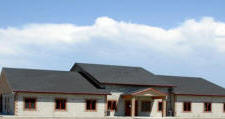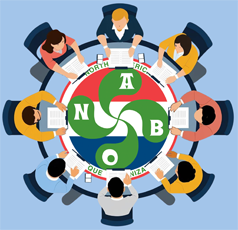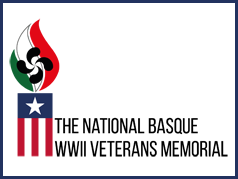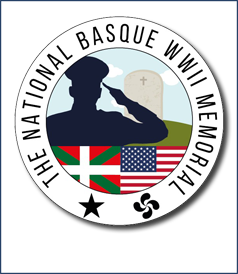Astero
EUSKAL ETXE BERRIA: Clubhouse inaugurated
The "Txoko Ona" Basque club inaugurated their clubhouse (June 2007) in splendid fashion. Invited to attend was NABO president Mary Gaztambide who provided us the following summary of the event, and then below is a related story by the Associated Press.
I [Mary Gaztambide, NABO President] had the pleasure to attend the "Txoko Ona" Basque Club's (Homedale, Idaho), dedication of their new club center this last weekend. What an impressive experience it was for me to see what a group of well organized and dedicated people can accomplish in such a short time! It was emphasized, that although the building and the club is situated in Homedale, it is a home and a Club for anyone interested in joining. Many Boise club members, among others, have become members.
 This is the exterior image of the newly completed Basque clubhouse. "Txoko Ona" means "good place" and that is what they have in this joint communal building of 7,600 sq. ft.. that sits on 10 acres. The club founded in 2000 already counts 300 members.
This is the exterior image of the newly completed Basque clubhouse. "Txoko Ona" means "good place" and that is what they have in this joint communal building of 7,600 sq. ft.. that sits on 10 acres. The club founded in 2000 already counts 300 members.
The club was formed in 2000 and four years later ten acres of land was purchased from the railroad, at about one fourth of the price it is worth today. Shortly thereafter, the club members began planning a building that would be suitable to fill all of their needs, and within two years, with many helping hands involved, the building is a reality and being enjoyed by many in the Basque Club.
It consists of a large dining or seating area, a large area with gaming tables and chairs to play cards with an adjacent bar, a smaller room to serve as a classroom, restrooms, of course, and a state of the art large kitchen, which I was told, was requested and planned by the women. Also, is a large covered patio with tables and chairs, and ample space in back of the building, where large tents and awnings were placed to serve food and drink, as well as accommodate venders After an extensive lawn area, where horse shoe pits have been installed, sits a large amphitheater with a large concrete floor and a grandstand for spectators, to view performing groups or accommodate outdoor dances. They still have ample cleared land to build whatever they see need for in the future; possibly a fronton or structure to hold large dances.
Along with the building came the friendly, hospitable, and proud members who were also serving copious food and drink to everyone.
Although, it is an enviable Club and Center, those of us belonging to Basque Clubs, with or without centers, need to dwell on what togetherness, organization and will can accomplish! We should all look to them as an example of what is possible!!
“Zorionak eta suerte on” to the Txoko Ona Basque Club of Homedale!
Basque culture spreading in Idaho
By The Associated Press; web source: seattletimes.nwsource.com
HOMEDALE, Idaho — The imprint of the Basque culture is obvious to many living in the Treasure Valley region: Boise is home to the nation's only city block of Basque businesses — restaurants, a market and a museum — and the state has the nation's largest population of Basque people.
Now the reach of Basque culture is growing, with Homedale set to become the site of a new Basque Center this summer.
A group called Txoko Ona raised $450,000 to build the 7,500-square-foot center by holding annual dances over the past several years. The building will include a hall, classroom, kitchen and patio, and could open as soon as July 4.
The opening ceremony could draw Basque people from all over Idaho and as far away as Spain, Txoko Ona group members said.
"I don't think there's a lot of Basque centers being built within the United States, so it's kind of a big deal for the Basque community, and even the Basques over in Spain," Homedale resident Danny Uranga told the Idaho Press-Tribune.
The Basque people have a long history in Idaho, which became a central location for the Basque people through a combination of economic and political forces. Lisa Gabiola's grandfather was one of many Basque people to come to Idaho in the early part of the last century to herd sheep, buying a farm in the Caldwell area.
Many Basques left their home region on the Spanish-French border to seek gold and silver in California and Idaho in the 1880s. When the precious metals proved difficult to find, they went to work herding sheep.
"The hope was that they could make a better life here and then send for their family or send money back to their families," Gabiola said.
Herding sheep was work that didn't require knowing English, and the jobs were readily available, Boise Basque Museum educator Nikki Gorrell said.
Another wave of Basque people came to the United States beginning in the 1930s, to escape the regime of Francisco Franco, who made it illegal to speak the Basque language or practice Basque culture.
In the years since, Basque people have gone into varied careers, but sheep herding helped maintain the Basque culture in Idaho. When sheep were sold in the winter, workers who were no longer needed required a place to stay. Boarding houses built throughout southwestern Idaho became places where Basque people could use their own language and traditions. Just four of the dozens of original boarding houses remain in Boise.
"The Basque haven't melted into the melting pot quite as much as some other ethnic groups," Gorrell said.
Today, Basques and their descendants work to keep their unique culture alive, with Basque groups in Caldwell, Homedale, Boise and other nearby cities.
Gabiola said Basques are very proud to be Americans. But after being denied their culture by Franco, they became even more protective of it.
"By coming here they had a chance to bring the language back and bring the culture back without fear of repercussion," she said.
The new Homedale Basque center will include space for computer-based Basque language lessons. The Basque language is ancient and has no known relationship to any other language.



















































































































